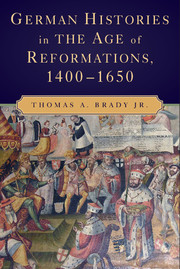Book contents
- Frontmatter
- Contents
- Figures, Maps, and Tables
- Acknowledgments
- A Note on Usages
- Map 1 The Empire in 1547
- Map 2 The Peace of Westphalia, 1648
- Part I The Empire, the German Lands, and Their Peoples
- Part II Reform of the Empire and the Church, 1400–1520
- Part III Church, Reformations, and Empire, 1520–1576
- 9 Urban Reformations
- 10 A Revolution of the Common Man
- 11 Imperial Reformations in the Age of Charles V
- 12 Imperial Peace, 1555–1580
- Part IV Confessions, Empire, and War, 1576–1650
- Appendix
- Glossary
- Bibliography
- Index
10 - A Revolution of the Common Man
Published online by Cambridge University Press: 05 June 2012
- Frontmatter
- Contents
- Figures, Maps, and Tables
- Acknowledgments
- A Note on Usages
- Map 1 The Empire in 1547
- Map 2 The Peace of Westphalia, 1648
- Part I The Empire, the German Lands, and Their Peoples
- Part II Reform of the Empire and the Church, 1400–1520
- Part III Church, Reformations, and Empire, 1520–1576
- 9 Urban Reformations
- 10 A Revolution of the Common Man
- 11 Imperial Reformations in the Age of Charles V
- 12 Imperial Peace, 1555–1580
- Part IV Confessions, Empire, and War, 1576–1650
- Appendix
- Glossary
- Bibliography
- Index
Summary
Injustice, poverty, slavery, ignorance – these may be cured by reform or revolution. But men do not live only by fighting evils. They live by positive goals, individual and collective, a vast variety of them, seldom predictable, at times incompatible.
Isaiah BerlinBetween 1524 and 1526 the southern and central German lands experienced the greatest rural insurrection in European history. Whether conceived as “the greatest natural event of the German state” or as “the first attempt of the popular masses to create a unified national state from below,” the Peasants' War was a moment of decision. The shocked reactions to it provoked a debate among the German rulers about Luther's movement – was it the cause of or the remedy for the upheaval? – and thereby initiated the transformation of the popular evangelical movements into the Protestant reformation. The insurrection itself has been called “a revolution of the common man.”
The ability of farmers, joined sometimes by burghers and miners, to carry out a large-scale insurrection depended fundamentally on their experience of communal government. Enabled by this heritage, in the first decades of the sixteenth century there arose a movement for village rights, against serfdom, and in favor of stronger governance with popular participation on a territorial level. The rebels justified their demands by an appeal to a “godly law” taught by the Bible, which, though it gained vigor from the religious ferment in the cities and towns, was actually older than Luther's movement.
- Type
- Chapter
- Information
- German Histories in the Age of Reformations, 1400–1650 , pp. 185 - 206Publisher: Cambridge University PressPrint publication year: 2009

